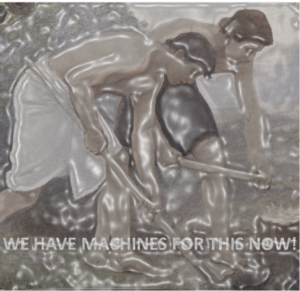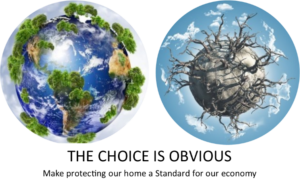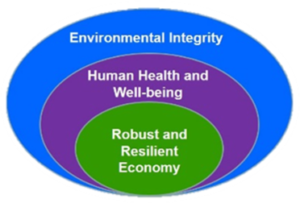Creating an up-to-date economic standard
By Technocracy Writer
Preface: I am not a scientist, I am not an economist, but, I am a systems thinker and see how the current economic system is not working in an efficient and sustainable manner. Like-minded people have gotten together and are now working on new thoughts about a world economy that will work in today’s fast paced culture. This is a very short depiction of an idea.
The Economic System we are in now is extremely outdated. It is based on labor hours and a need to create scarcity. It is sustained through a constant need to increase our purchasing and debt to sustain itself. The system worked when it was based on the metrics of approximately 98% human labor providing goods and services and 2% using extraneous energy or “other than” human labor. This doesn’t work any longer; currently, ~ 98% of all labor and services use extraneous energy.

Our economy also is supposedly based on a Gold Standard. But, how much of the currency in circulation is backed by gold or tangible resources, how much is fiat-backed, only there because someone says it is?
There are many intelligent, resourceful people from all areas of the world, all types of outlooks, businesses, sciences, and cultures working on a New Economic System. I have done much research on what is available to laypeople such as myself.
What I haven’t seen so far, is a simple system that would set standards that consider the impact and effect on society and the environment. What if we looked at arranging the economy so there is not a Gold Standard, or a Resource/Commodity Economy, or a Fiat Economy, but an Environmental Standard Economy?
Could we still have a global economy? Yes, it would swiftly change the world if impacts on society and the environment will be the main standards for an economy.
How will this change the world?
Businesses that have minimal or positive impact on the environment and society will become the leaders in the economy; and businesses that pollute or have a negative effect on society will be at the lower end of the economy.
The term ‘Profit based’ will become synonymous with positive impact rather than the current meaning (often times) denoting negative / harmful impacts on society and / or the environment.
If we adjust the criteria for the economy, positive changes would happen very quickly. The companies that have funding resources would want to continue to have a profit and would adjust their business practices quickly to include and eventually become more sustainable.
This could also be taken down to an individual level. A person who lives in a proven sustainable manner could get a large environmental tax credit. Fiscal benefits motivate many people in a way that being told they are “helping the environment” doesn’t.

There has been research done regarding the metrics, determinants, and components of those standards. What value to set on zero carbon footprint, what value to set on massive oil spills. How will impact on our societies be measured and valued? These are questions that still need to be researched.
SOME QUESTIONS to review with an open mind:
Is the world ready for a system that would value long-term societal and environmental thinking over short-term gain? Are we ready to admit that scarcity is not a reality? Do we see that with using only the technology currently available that the world has the ability to care for every person on earth?
Are we willing to stop using a system of Labor for Dollars and replace it with Societal Input for Sustainability?
You who have children:
Do you want your child taken care of in the best way possible? To be nurtured, taught to think for themselves, taught how to get along with others? Of course you do! What if a child care worker’s societal service (societal input) was valued as highly as a doctor, an engineer, a pilot?
Would you not feel safe and comfortable knowing that the people who are taking care of your children have their best interests at heart and mind? Although many childcare employees are wonderful and love children, sadly, there are many childcare workers who are people who cannot get any other jobs and are there to get a paycheck and ‘be a body’ to comply with federal standards.
To those who use vehicles:
Would you feel it was a different world where each car: was built for long-term sustainability; had interchangeable components that can be used even when styles change; used materials that are meant to be recycled and upgraded easily;
What if your service station was not rewarded based on how many new (often irrelevant) services that they sold to you, but on how well they performed the job and the environmentally impact of their practices? Would society be different if customer service was real and based on how well they handle customers using a positive and mediation-style of communication. Instead of remuneration based on hours worked and services sold, they were rewarded based on how well their services / products impacted society and the environment.
How will the Environmental Economy be set up?

In a nutshell, as there are very few details at this point;
- The metrics would be chosen
- The determinants set
- The values determined
- The transition planned
- The impacts measured
- The results studied
- The metrics adjusted if needed
- The determinants and values adjusted
- The Standards would get more stringent as the world adjusts to better practices
- And on, to keep the Standard applicable to the current market
And you can help with this! What metrics would be best, how should we measure societal and environmental impacts? What would be the best way to transition?
